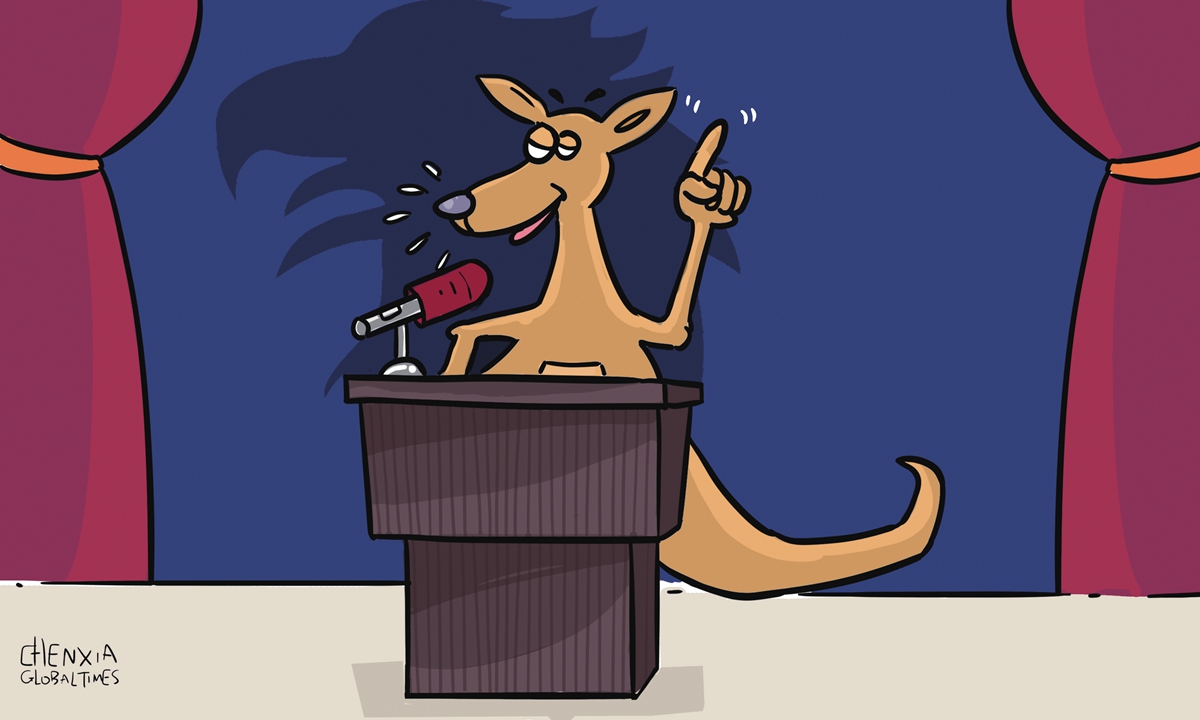‘Microphone diplomacy’ no help to Australia's national interests
By Guo Chunmei Source: Global Times Published: 2020/12/7 16:18:40

Illustration: Chen Xia/GT
In 2020, Australia, with its "microphone diplomacy," has unprecedentedly become the focus of attention of Chinese and foreign media. As such, it has successfully shaped its international image as an anti-China "pioneer." It has also caused a sharp decline in China-Australia relations, repeatedly setting new lows.Not long after the signing of the Regional Comprehensive Economic Partnership (RCEP) on November 15, Australian Prime Minister Scott Morrison took soft stances in his public speeches in regards to China-Australia relations. Some observers felt this was a turning point in China-Australia relations.
But then Morrison became furious and demanded that China apologize over the use of a photo-cartoon depicting Australian soldiers' atrocities in Afghanistan by the spokesperson of Chinese Foreign Ministry Zhao Lijian on Twitter last week. This was followed by the Australian Parliament passing the "Foreign Relations Bill 2020" which aims to interfere in the cooperation between Australian states and foreign entities. This has made China-Australia relations hit rock bottom again.
Australia's approach of "microphone diplomacy" toward China is actually caused by opportunism. Canberra attempts to take advantage of the intensifying China-US competition, pretending that "Big Bad Beijing" is bullying it to generate international sympathy and support. The Morrison government hopes to peddle "China threat" theory to divert attention from domestic problems and consolidate its ruling. But does its China policy that screwed up China-Australia relations really elevate the "national interest" of Australia? No, it does not.
In terms of economic development, Australia is a trade-oriented country. Today, one fifth of its domestic employment depends on exports. China is Australia's largest trading partner. And China accounts for nearly 40 percent of overall exports out of Australia.
Australia experienced its first economic recession in 29 years due to the coronavirus pandemic. Australian Federal Treasurer Josh Frydenberg recently made a rare speech, stressing that without the support of China, the Australian economy will face a serious challenge recovering from the coronavirus.
As for national security, China and Australia are both important countries in the Asia-Pacific region. The two have no historical enmities or direct conflicts of interest. Regional peace and stability are in the common interests of China and Australia. However, in the context of the competition between China and the US, some Australian politicians with ulterior motives are eager to "choose sides." Quite quickly they seek to "politicize" normal cultural and economic exchanges between China and Australia and raise them to the national security level. Some insightful people in Australia once pointed out bitterly that Australia is too concerned about "national security" and has forgotten what Australia's "national interest" is.
In terms of social solidarity, Australia touts its pluralistic society. But since the outbreak of the COVID-19 pandemic, the Australian government has hyped up the "coronavirus originated in China" line, even alluding to wild conspiracy theories. This has allowed domestic racism and anti-Chinese sentiments to rise. The "China-phobia" and "anti-Chinese" ideas that the Australian government has allowed (or even promoted) has torn apart Australian society and undermined social unity.
In face of a crisis in the China-Australia relations, more and more Aussies of insight, risking being labeled "pro-China," have stood up to speak for the restoration of bilateral relations. This is commendable.
Regardless of whether or not Morrison is heeding their words, he intended to tone down the spat he'd triggered. He has since expressed that his aim was for the two countries to have a "happy coexistence."
Friendship between China and Australia is still in the common interests of the two countries. If the Morrison government can truly take a long-term view, seek common ground while reserving differences, reduce speculation and arrogance, and be more sincere and peaceful in its contacts with China, it may find that it is not so difficult to reset China-Australia relations.
The author is expert on Australian studies at the China Institutes of Contemporary International Relations. opinion@globaltimes.com.cn
Posted in: VIEWPOINT,ASIAN REVIEW